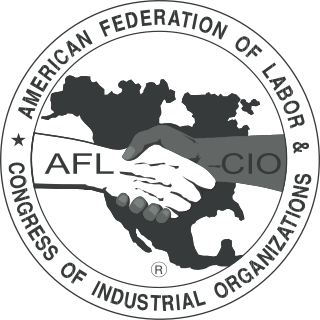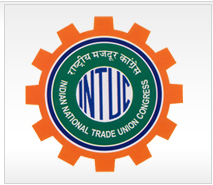Related Research Articles
A trade union, often simply referred to as a union, is an organization of workers who have come together to achieve common goals, such as protecting the integrity of their trade, improving safety standards, and attaining better wages, benefits, and working conditions through the increased bargaining power wielded by solidarity among workers. Trade unions typically fund the formal organization, head office, and legal team functions of the trade union through regular fees or union dues. The delegate staff of the trade union representation in the workforce are made up of workplace volunteers who are appointed by members in democratic elections.

In politics, lobbying, persuasion, or interest representation is the act of lawfully attempting to influence the actions, policies, or decisions of government officials, most often legislators or members of regulatory agencies. Lobbying, which usually involves direct, face-to-face contact, is done by many types of people, associations and organized groups, including individuals in the private sector, corporations, fellow legislators or government officials, or advocacy groups. Lobbyists may be among a legislator's constituencies, meaning a voter or bloc of voters within their electoral district; they may engage in lobbying as a business. Professional lobbyists are people whose business is trying to influence legislation, regulation, or other government decisions, actions, or policies on behalf of a group or individual who hires them. Individuals and nonprofit organizations can also lobby as an act of volunteering or as a small part of their normal job. Governments often define and regulate organized group lobbying that has become influential.

The Labor Management Relations Act of 1947, better known as the Taft–Hartley Act, is a United States federal law that restricts the activities and power of labor unions. It was enacted by the 80th United States Congress over the veto of President Harry S. Truman, becoming law on June 23, 1947.

The American Federation of Labor and Congress of Industrial Organizations (AFL–CIO) is the largest federation of unions in the United States. It is made up of 56 national and international unions, together representing more than 12 million active and retired workers. The AFL–CIO engages in substantial political spending and activism, typically in support of liberal or progressive policies.

United Kingdom labour law regulates the relations between workers, employers and trade unions. People at work in the UK can rely upon a minimum charter of employment rights, which are found in Acts of Parliament, Regulations, common law and equity. This includes the right to a minimum wage of £9.50 for over-23-year-olds from April 2022 under the National Minimum Wage Act 1998. The Working Time Regulations 1998 give the right to 28 days paid holidays, breaks from work, and attempt to limit long working hours. The Employment Rights Act 1996 gives the right to leave for child care, and the right to request flexible working patterns. The Pensions Act 2008 gives the right to be automatically enrolled in a basic occupational pension, whose funds must be protected according to the Pensions Act 1995.
The Canadian Union of Public Employees is a Canadian trade union serving the public sector – although it has in recent years organized workplaces in the non-profit and para-public sector as well. CUPE is the largest union in Canada, representing some 700,000 workers in health care, education, municipalities, libraries, universities, social services, public utilities, transportation, emergency services and airlines. Over 60% of CUPE's members are women, and almost a third are part-time workers. CUPE is affiliated with the Canadian Labour Congress and is its greatest financial contributor.

Indian National Trade Union Congress (INTUC) is the trade union wing of the Indian National Congress. It was founded on 3 May 1947 and is affiliated with the International Trade Union Confederation. According to provisional statistics from the Ministry of Labour, INTUC had a membership of 33.3 million in 2013, making it the largest Trade Union in India.
Section 51(xx) of the Australian Constitution, is a subsection of Section 51 of the Australian Constitution that gives the Commonwealth Parliament the power to legislate with respect to "foreign corporations, and trading or financial corporations formed within the limits of the Commonwealth". This power has become known as "the corporations power", the extent of which has been the subject of numerous judicial cases.

Union busting is a range of activities undertaken to disrupt or prevent the formation of trade unions or their attempts to grow their membership in a workplace.

The Trade Union and Labour Relations (Consolidation) Act 1992 is a UK Act of Parliament which regulates United Kingdom labour law. The Act applies in full in England and Wales and in Scotland, and partially in Northern Ireland.
Lehnert v. Ferris Faculty Association, 500 U.S. 507 (1991), deals with First Amendment rights and unions in public employment.

The Industrial Disputes Act, 1947 extended to the whole of India and regulated Indian labour law so far as that concerns trade unions as well as Individual workman employed in any Industry within the territory of Indian mainland. Enacted on 11 March 1947 and It came into force 1 April 1947. It was replaced by the Industrial Relations Code, 2020.
NLRB v. J. Weingarten, Inc., 420 U.S. 251 (1975), is a US labor law case decided by the Supreme Court of the United States. It held that employees in unionized workplaces have the right under the National Labor Relations Act to the presence of a union steward during any management inquiry that the employee reasonably believes may result in discipline.

Academic Engineers and Architects in Finland TEK is a Finnish trade union of university-educated engineers, architects and scientists. In addition, the TEK is a learned society and the professional body of the engineering profession. The union requires that its full members have a master's degree or equivalent in engineering, architecture, mathematics, physics or in other sciences related to technology.

Broadway Shopping Centre,, is the principal covered shopping centre in the town centre of Bexleyheath and is the largest single covered shopping facility in the London Borough of Bexley.

Greater London Association of Trade Union Councils (GLATUC) is the largest County Association of Trades (Union) Councils in the Uk and covers the Greater London area. As the official Trades Union Congress body for London GLATUC seeks to co-ordinate activity by Trades (Union) Councils across the capital and works with individual unions and other organisations on a range of campaigns and activities. It is part of the national Trades Union Congress.

The Labor Council of New South Wales, branded Unions NSW, is the peak body for trade unions in the state of New South Wales, Australia. As of 2005 there are 67 unions and 8 Rural and Regional Trades & Labor Councils affiliated to the Labor Council, representing 800,000 workers in NSW. It is registered as the State Peak Council of Employees under Section 215 of the Industrial Relations Act 1996 (NSW). The Council is affiliated with the Australian Council of Trade Unions (ACTU).
South African labour law regulates the relationship between employers, employees and trade unions in the Republic of South Africa.

The Los Angeles streetcar strike of 1919 was the most violent revolt against the open-shop policies of the Pacific Electric Railway Company in Los Angeles. Labor organizers had fought for over a decade to increase wages, decrease work hours, and legalize unions for streetcar workers of the Los Angeles basin. After having been denied unionization rights and changes in work policies by the National War Labor Board, streetcar workers broke out in massive protest before being subdued by local armed police force.
The Parliamentary Committee of the Trades Union Congress was the leading body of the British trade union movement from 1871 until 1921.